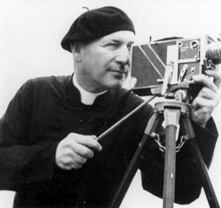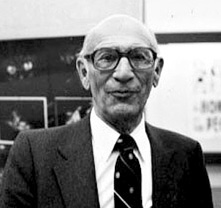Maurice Proulx (1902-1988)
-

Maurice Proulx and his faithful 16mm Cine-Kodak Special camera.
Source : Cinémathèque québécoise, 2000.0039.PH.01
-

Photographic portrait of Maurice Proulx.
Source : Cinémathèque québécoise, 2000.0039.PH.02
Priest and Professor of Agronomy
Maurice Proulx, the son of a farmer, was devoted to activities involved in working the land his entire life. He became a priest in 1928 and gladly agreed to specialise and study to become an agronomy professor at the École d’agriculture de Sainte-Anne-de-la-Pocatière at Université Laval. After his studies there he undertook doctoral studies at Cornell University in the United States. There, a professor introduced him to cinema as a pedagogical tool. Knowing that many farmers were still illiterate, he recognised its potential.
Upon his return to Quebec, he obtained a 16mm film camera. From that point on, his entire working life was divided between teaching and his love of cinema; the two were to meet in the numerous pedagogical films he produced.
Filming the Settlers
From 1934 to 1937, Proulx became the propagandist for the settling of remote areas of Quebec. He filmed a group of settlers from his diocese leaving for Abitibi, which resulted in the first feature-length sound documentary in Quebec, En pays neufs, which was widely seen throughout Quebec.
He returned to the theme of settling in 1938, this time in the Gaspé region, with En pays pittoresque, which also served to promote the region for tourism. He filmed the Saguenay, Iles de la Madeleine and Quebec City regions with the same goal of promoting tourism in mind.
Films, not Manuals
In the meantime, Proulx had begun producing didactic films in the field of agronomy. These documentaries covered a great many topics, from keeping work horses and the “enemies of the potato” to tobacco, flax, strawberries, sugar beets, etc.
His experience and his friendship with liberal Premier Adélard Godbout, who had been his professor of agronomy, led him to participate actively in the founding of the Service de ciné-photographie in 1941. After that date, many of his films were funded by this government agency. When Maurice Duplessis took power in 1944, Proulx managed to become his friend too, despite his being Godbout’s political adversary.
A Man at Ease with Duplessis’ Ideology
Proulx’s fundamental belief in the conservative values of farming, family and religion were entirely compatible with the ideology of Duplessis. Several of his films did not pass up the opportunity to praise the accomplishments of the Union nationale party.
In addition to his didactic films, Proulx made a great many short films on religious events, especially the large gatherings that took place in the 1940s and 50s. These films were shot throughout Quebec, in Ottawa and even in Rome.